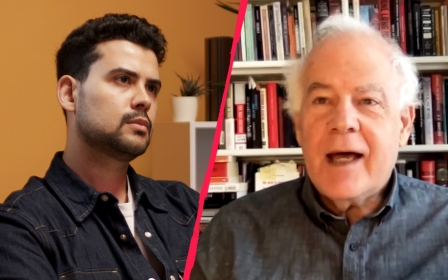Pro-Israel groups 'shaping US university discourse on Gaza'

Israel has poured millions of dollars into campaigns aimed at shaping US legislation and university debates on Israel and Palestine, according to documents reviewed by The Guardian.
According to Israeli parliament documents, Minister of Diaspora Affairs Amichai Chikli oversaw 32m shekels ($8.6m) and over 80 programmes in a relaunch of the organisation, Voices of Israel.
Since Israel's war on Gaza began on 7 October, Voices has been helping non-profits and other groups stifle pro-Palestine views in US universities, media companies, and legislative bodies.
Voices previously campaigned for state laws to punish Americans who engage in Boycott, Divestment, and Sanctions (BDS) activities against Israel.
Previously known as Concert, Voices was envisioned as a “PR commando unit” by ex-Israeli ambassador to the US Gilad Erdan. Its website declared its fundamental goal as to “enhance the image of Israel”.
New MEE newsletter: Jerusalem Dispatch
Sign up to get the latest insights and analysis on Israel-Palestine, alongside Turkey Unpacked and other MEE newsletters
One of the largest groups funded by Voices is the Institute for the Study of Global Antisemitism and Policy (ISGAP), whose research was cited in the congressional hearing of Harvard ex-president Claudine Gay.
In January, Gay resigned after facing backlash from pro-Israel groups for allegedly condoning antisemitism.
ISGAP’s director Charles Small previously claimed at an Israeli parliament hearing that Students for Justice in Palestine, an umbrella organisation for pro-Palestine activism including the Columbia University encampment, was the "armed forces" of the Muslim Brotherhood.
CyberWell, a group headed by Voices officials and former Israeli military intelligence, called Facebook and Instagram's parent company Meta to suppress the slogan “from the river to the sea, Palestine will be free”, comparing it to the Q-Anon slogan “where we go one, we go all”.
Another organisation, Mosaid United, whose president said it will receive 48m shekels ($13m) from the Israeli government this year, is a donor to Hillel International, the largest Jewish campus organisation in the world.
Hillel's chief executive appeared before the Israeli parliament to discuss the organisation's achievements, which include influencing the Massachusetts Institute of Technology's president to suspend its Students for Justice in Palestine chapter.
The US Foreign Agents Registration Act required disclosure from groups that receive foreign funding, but none of the groups mentioned in The Guardian's report were registered under the act.
Earlier this month, the New York Times revealed that a £1.6m ($2m) pro-Israel social media campaign targeting US lawmakers was commissioned by Chikli’s Ministry of Diaspora Affairs.
Hired by the ministry, political marketing firm Stoic created 600 fake accounts and published 58,000 posts, circulating ChatGPT-generated content that praised Israel and criticised the United Nations agency for Palestine refugees (Unrwa).
Dozens of other tech start-ups were also invited to become “digital soldiers” and “warriors for Israel,” according to messages and recordings of the ministry's meetings.
Defining antisemitism in US law
Israel-backed organisations also worked to shape legislation surrounding antisemitism, according to their leaders' testimony in the Israeli parliament.
In January, an Israeli parliamentary committee discussed how encouraging countries to adopt the International Holocaust Remembrance Alliance (IHRA) definition of antisemitism is a strategic priority for Israel.
The controversial IHRA definition has been accused of conflating anti-Zionism with antisemitism.
One example of antisemitism in the definition includes “claiming that the existence of a State of Israel is a racist endeavour”.
ISGAP's managing director and former Israeli intelligence officer Brigadier General Sima Vaknin-Gill told the Israeli parliament that it was easier to influence US policy at the state and local level instead of the federal government.
Georgia, South Carolina, and South Dakota have passed laws codifying IHRA's definition into hate crime statutes.
Nevertheless, the US House of Representatives has passed a bill codifying the IHRA definition into law. If passed by the Senate, the bill would allow the Department of Education to cut resources from campuses perceived as antisemitic.
Middle East Eye delivers independent and unrivalled coverage and analysis of the Middle East, North Africa and beyond. To learn more about republishing this content and the associated fees, please fill out this form. More about MEE can be found here.





